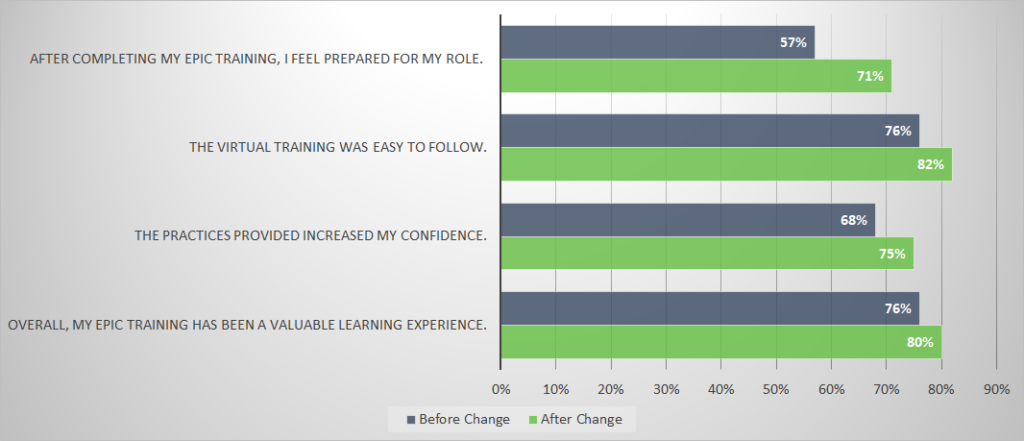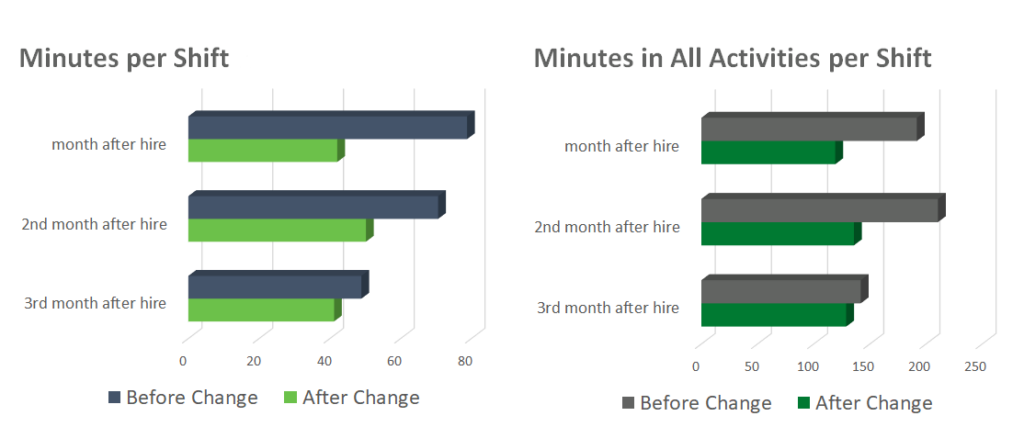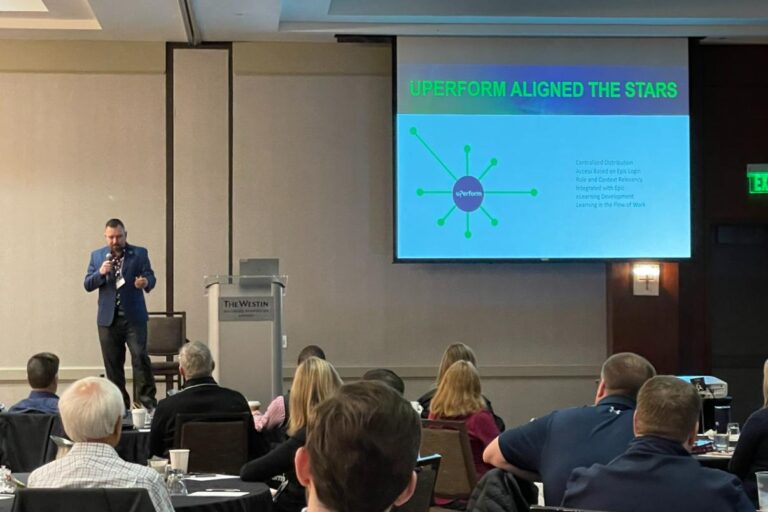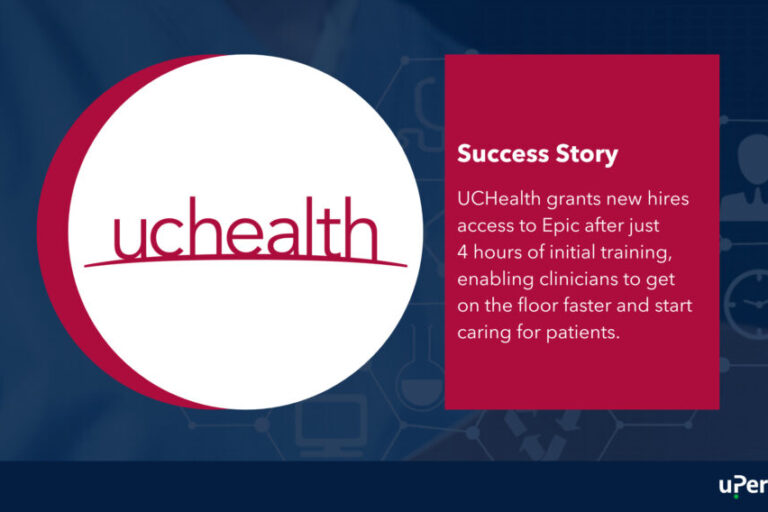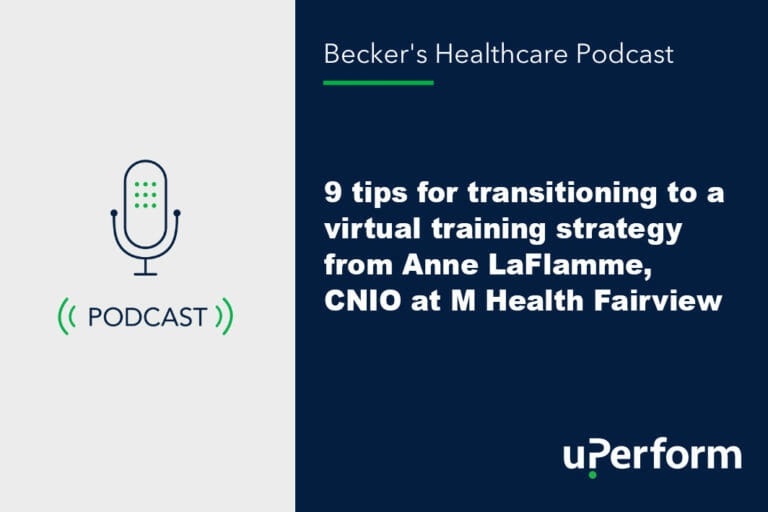At this year’s Epic XGM conference, Aspirus Health shared how they’ve revitalized their new hire onboarding to meet the learner where they are in the learning process, offering multiple learning modes to teach workflows and courses cascaded over time. The new strategy has improved the training experience for new hires and improved clinical use of the EHR.
We’ve put together a recap of the presentation. If you have Epic login credentials, you can also view the presentation in its entirety by accessing the link below.
The Challenge
In 2020, Aspirus Health, like many others, made the switch to virtual training. It was a quick transition, occurring over the course of a weekend. They hastily compiled a library of training materials that addressed their needs at the time.
However, Aspirus then went through a period of growth, acquiring nine hospitals and upwards of 30 clinics while adding few training team members. This meant those hastily compiled training materials that were meant to be temporary remained in circulation into 2022.
In 2022, the Aspirus team determined through new hire survey data and operational input that the training materials compiled in 2020 were not meeting the organization’s needs. New hires were not able to interact with their workflows prior to their first shift and training materials did not reflect the workflows they would be using.
The solution
As they looked to revitalize their training, Aspirus wanted to ensure that new hire training reflected the Aspirus standard workflows and would be validated by those using the tools. Their search for a tool to create interactive eLearnings that would be accessible by all Aspirus Epic users led them to uPerform.
Not only does uPerform enable Aspirus to create the interactive training materials they sought, but it also increases the training team’s efficiency by enabling them to create simulations and tip sheets simultaneously. These learning materials can then be embedded into courses or directly into the Epic workflow.
Another important component of Aspirus’ new training strategy was their decision to implement a Curriculum Review Board (CRB). The CRB is made up of experts on various Epic applications and modules that review and validate Aspirus’ training curricula. The following roles are represented as part of Aspirus’ CRB:
- Clinical Informatics
- Providers
- Nurses (Educators and Super Users)
- Techs (Lab, Rad, Pharm)
- Directors
- Operational Leaders
Aspirus formed approximately 15 individual CRBs, with an average group size of 8 – 10 members, organized by role and workflow. The purpose of the CRBs was to ensure representation from various stakeholders in the design, creation, delivery and maintenance of training materials.
The results
The combination of transitioning to a just-in-time training strategy supported by uPerform and establishing CRBs proved to be a resounding success for Aspirus. Since implementing the changes in 2022, Aspirus Health has:
- Increased satisfaction with the virtual training experience
- Achieved 96% proficiency for new nurse hires on post-training assessments
- Reduced time nurses spend in Epic by 50%
Let’s dive in.
Increased satisfaction with training
Aspirus implemented their new interactive training strategy during the fall of 2022. They witnessed improved feedback across the board. Clinicians feel more prepared for their roles and reported increased agreement that virtual training was easy to follow.
Feedback from learners included “the interactive piece was very beneficial,” “It seems very realistic, and that definitely helps me feel prepared for floor orientation,” and “I felt it was informative and the courses were relevant to what I will need to know.”
The feedback emphasized the importance of delivering training experiences that are workflow specific, interactive and promote autonomy.
High proficiency scores
End User Proficiency Assessment scores back up end user claims that training helped them feel prepared for their role. Aspirus implemented the End User Proficiency Assessment as part of its training revitalization. To be considered proficient, learners must obtain a passing score of 80%. Those who do not pass are required to participate in a 1:1 session with an educator. 96% of all learners passed their assessments.
Reduced time spent in Epic
Time spent in the EHR has been a hot button topic in recent years, particularly as it relates to healthcare worker burnout. Numerous studies have linked time spent in the EHR to increased levels of clinician burnout.
Fortunately for Aspirus, learners’ positive feedback and 96% pass rate on the End User Proficiency Assessments translated to vastly improved proficiency in Epic. With their new training strategy, Aspirus reduced the time nurses spend in Epic, especially in their first two months on the job.
On average, hospital nurses saved 40 minutes per day in charting after the training refresh. Looking deeper into the data, Aspirus found that new hires spent half as much time in orders and notes activities and a third of the time in medication administration over the course of all their shifts in the first month.
Aspirus’ new onboarding strategy gets new nurses up to speed using their Epic workflows faster and continues to save nurses time three months into their new role.
Train more effectively with uPerform
Looking for a more efficient health IT training solution that will improve satisfaction and drive EHR proficiency? uPerform’s just-in-time learning capabilities enable health organizations to create high quality training materials in a fraction of the time, allowing them to scale support and drive user satisfaction proficiency.
Contact us today to learn how uPerform can support your organization’s health IT training goals.

